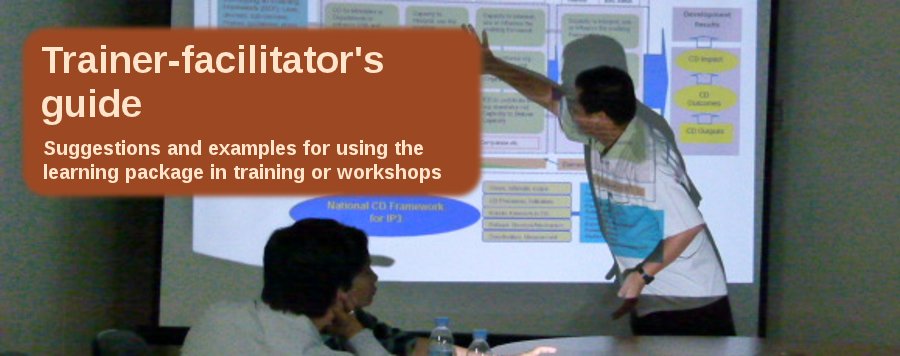
Introduction
This section offers some guidance for anyone who wants to use the materials for workshops or training events. The learning package was not developed to be a training course. It was developed to be a resource for learning processes across the range of self and group study, and informal and formal learning exercises. These guidance notes are not, therefore, a training manual but rather suggestions and examples for anyone who wants to use the learning package materials in training or workshops. The guidance gives some ideas for how to use the materials with questions and exercises that can be used to explore and deepen understanding of any of the components of the resource package.
If you use the materials as a resource you are invited to share your experience. Please add your session plans or other information about what you did so that this resource can be expanded over time based on live experience. Please feel free to add comments at the bottom of any page of the Learning Package.
The layout is as follows:
- Introduction and general points of guidance (this page)
- Ideas for using the Core Concept section
- Sample sessions plans using the Core Concept section, based on workshops to pilot the materials
- Ideas for using the ‘How-to’ pages
- A PowerPoint presentation based on the Core Concept section.
NOTE: it is not suggested that this presentation is used in its entirety, or in the same order. It is offered as a resource from which trainers and facilitators can select slides to use in any way they need.
General points of guidance
- This isn’t something that can be presented as a neutral learning exercise – the participants will be concerned and engaged with the meaning and application for their own situation and needs. So it is essential that:
- Wherever possible you use live examples from the participants’ working environment to illustrate the general information. If for example, there is a Ministry Capacity Development Strategy available it should be presented as the working example to show analysis of the different aspects of the information.
- Additionally, as the facilitator you need to be ready to adapt as participants’ issues emerge if the programme doesn’t already cover what they are most concerned about.
- The best starting point for a training session or workshop, whoever your participant group, is an exercise that explores how the participants understand capacity in their own context. In this way you can set the scene for the relevance and applicability of all the materials that you offer in the rest of the process. Being able to relate the materials to their own context will help the participants’ learning as they assess the relevance and whether or not the general ideas really work for them.
- It would be important to stress throughout presentation of the materials that:
- What is offered is NOT a new model or approach to capacity development, but a synthesis of current understanding based on the ideas of a lot of different agencies, and
- The materials do not promote any one model or approach as being better than others because all the models and theories have been developed to suit the mandate of different agencies
- Everyone needs to chose for themselves what works for them
- You will need to make your own decisions about how to use the suggestions offered here depending on:
- The profile of your participants
- How many participants you have in the group
- The learning objectives set for the exercise, and
- The time you have available. In general terms for groups of more than a few people (say 8 – 10) it is better to limit whole group presentations and discussions because group dynamics will usually prevent everyone from participating fully. If you have the time, and the learning objective requires depth, then it is better to have the participants actively working in small group exercises where they can focus very specifically on their own situation.
- One aspect of the materials you will need to think about carefully is how much information to give about the background and current efforts to achieve a paradigm shift in the policies and practices of capacity development. For example, senior government officials who work on a daily basis with development partners will likely be very familiar with issues such as the Accra Agenda for Action, South-South cooperation and so on. They may be very aware of the current challenges and wanting to make those challenges the focus of their learning, for example about results. Others, maybe people who have a strong technical orientation to their work, will not necessarily be familiar with these issues and will need some basic inputs on the ‘big picture’ issues to help them understand the context of the other information you will be sharing with them, i.e. why so many different agencies are paying so much attention to capacity development. This type of participant might not be ready to look at the current challenges in detail.
Next section: Ideas for using the Core Concept section